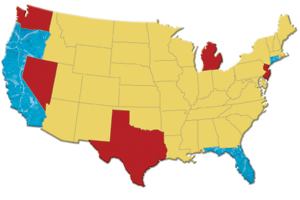Lawmakers throughout the country are following California’s lead in legislating more energy-efficient pools and spas, but the proposed language could cause problems.
Bills in Texas, Nevada, Michigan, New Jersey and Washington mandate requirements for portable spas and pool pumps using the original text of California’s Title 20 regulations. However, the language in that code has since been amended to clarify pump requirements and alter spa- testing standards.
“They’re pulling sections out of Title 20, but there are no teeth in that because Title 20 has about 15 pages related to pools [and spas],” said Steve Barnes, chairman of the Association of Pool & Spa Professionals’ Technical Committee, and product manager of safety and compliance at Pentair Water Pool & Spa in Sanford, N.C.
By using only part of the energy regulations, lawmakers are leaving out the language that includes replacement motors and defines a pump’s total horsepower. Furthermore, in using the old version, once again spa manufacturers are held to an almost impossibly strict standard for testing efficiency.
The Aquatic Professionals Education Council, an Austin, Texas-based lobbying group, is working with legislators to amend the Texas bill. However, it may deviate from California’s requirements.
“One of the things we’ve agreed with is a simple first step … [by] just going to cap-start, cap-run motors,” said Kevin Tucker, APEC’s public information officer. “The cost to the consumer is very low.”
The Nevada bill was introduced in March, but hasn’t moved past its first committee.
“We’ve been tracking two or three bills, but that one doesn’t seem to be getting a lot of interest at this point,” noted Terry Mayfield, manager of APSP’s Southwest Region.
The adoption of out-of-date energy language for pools and spas has happened before. Connecticut, Oregon and Florida already have adopted the old Title 20 language.
For its part, the Connecticut Office of Policy and Management has issued a temporary allowance for manufacturers who comply with California’s new efficiency provisions.
Florida’s regulations don’t take effect until 2011, giving lawmakers ample time to adjust the language as necessary. Updated language on spa efficiency testing and pool pumps could be taken directly from the upcoming federal Energy Policy and Conservation Act if an amendment is passed to include pools and spas.
“One of the reasons we pushed for the 2011 date on the bill last year is specifically because we had national standards coming down the tube,” said Jennifer Hatfield, director of government and public affairs at the Florida Swimming Pool Association.
APSP leadership is advising the amendment’s authors on how to include language that mirrors the newly amended Title 20. To create consistency, APSP also has formed standards writing committees for pool and spa efficiency. The groups began meeting first week of April and aim to develop uniform language that can be referenced by manufacturers and state alike.



